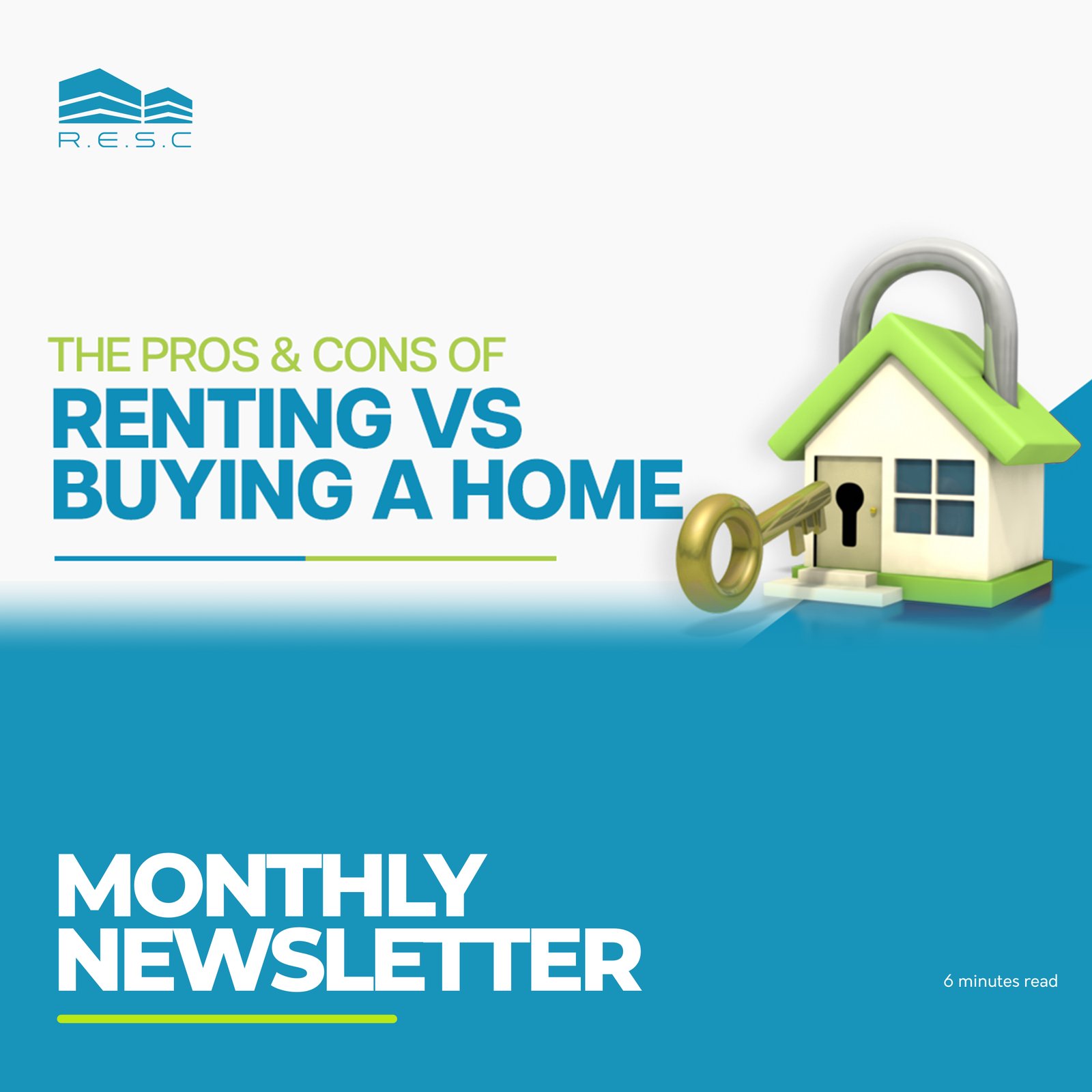Should I Buy or Rent? Pros and Cons
May 22, 2024 6 Minutes Read

Welcome to our May 2024 newsletter! This month, we’re diving into one of the most important decisions many of us face should you buy or rent a home? In the vibrant and ever-evolving Ghanaian real estate market, this question is more relevant than ever. Let’s explore the pros and cons of each option to help you make an informed decision that suits your lifestyle and financial goals.
The Case for Buying a Home
Pros:
-
Equity Building
- Long-Term Investment: Every mortgage payment you make builds equity in your home, which can be a significant financial asset. Unlike renting, where your money goes into someone else’s pocket, buying a home allows you to build personal wealth.
- Appreciation Potential: Over time, property values in Ghana tend to appreciate. This means that your home could increase in value, giving you a substantial return on investment.
-
Stability and Security
- Permanent Residence: Owning a home provides a sense of stability. You won’t have to worry about lease renewals or rent hikes.
- Control Over Property: You can make any modifications you like, from painting walls to renovating kitchens, without needing landlord approval.
-
Tax Benefits
- Mortgage Interest Deductions: Homeowners can benefit from tax deductions on mortgage interest and property taxes, making homeownership more financially appealing.
Cons:
-
Upfront Costs
- Down Payment and Closing Costs: Buying a home requires a significant upfront investment, including down payments, closing costs, and other fees.
- Maintenance Expenses: Homeowners are responsible for all repairs and maintenance, which can add up over time.
-
Less Flexibility
- Tied to One Location: If you’re someone who likes to move frequently, buying a home might restrict your mobility.
- Market Risks: The property market can be unpredictable. Economic downturns can impact property values, affecting your investment.
The Case for Renting a Home
Pros:
-
Flexibility
- Easier to Relocate: Renting provides the freedom to move without the hassle of selling a property. This is ideal for those with jobs that require frequent relocations or for those who enjoy exploring new neighborhoods.
- Short-Term Commitment: Lease agreements typically last one year, giving you the option to reassess your living situation regularly.
-
Lower Upfront Costs
- No Large Down Payment: Unlike buying, renting doesn’t require a substantial initial investment. You usually only need a security deposit and the first month’s rent.
- Less Financial Responsibility: Renters aren’t responsible for property taxes, maintenance, or major repairs, which can lead to significant savings.
-
Access to Amenities
- Modern Conveniences: Many rental properties come with amenities like swimming pools, gyms, and security services that might be expensive to maintain as a homeowner.
Cons:
-
No Equity
- No Ownership: Rent payments do not contribute to building equity or personal wealth. You’re essentially paying for the right to live in someone else’s property.
- No Appreciation Benefits: Renters miss out on property value appreciation, which can be a substantial financial loss over time.
-
Less Stability
- Lease Renewal Uncertainty: Renters may face uncertainty regarding lease renewals and potential rent increases.
- Limited Control: Renters cannot make significant changes to their living space and must adhere to the landlord’s rules and restrictions.
Unconventional Considerations
-
Rent-to-Own Options
- Pathway to Ownership: Some landlords offer rent-to-own agreements, allowing renters to purchase the property after a set period. This can be a good middle ground for those uncertain about committing to buying immediately.
-
Co-Living Spaces
- Shared Living: Co-living is becoming popular, especially in urban areas. It involves sharing a living space with others, reducing costs, and fostering community.
-
Home Exchange Programs
- Temporary Swaps: For those who travel frequently, home exchange programs can offer the opportunity to live in different places without the need for long-term leases or purchases.
-
Crowdfunding Real Estate Investments
- Invest Without Buying: Platforms that allow multiple investors to pool their money to buy properties can offer exposure to real estate without the need to manage a property directly.
RESC’s Expertise in Action
At RESC, we understand the complexities of the Ghanaian real estate market. Whether you decide to buy or rent, our team is here to guide you through every step of the process.
Buying Assistance:
- Property Search: We help you find the perfect property that meets your needs and budget.
- Legal Guidance: Our experts ensure all legal aspects of your purchase are handled smoothly.
- Financing Options: We assist in finding the best mortgage rates and financing solutions.
Renting Assistance:
- Rental Listings: We offer a wide range of rental properties in prime locations.
- Lease Negotiation: Our team helps negotiate favorable lease terms on your behalf.
- Relocation Services: We provide comprehensive support for those relocating within Ghana.
Conclusion: Making the Best Decision for You
Ultimately, the decision to buy or rent depends on your personal circumstances, financial situation, and long-term goals. Both options have their merits and drawbacks, and what’s right for one person might not be ideal for another.
Need personalized advice? Contact us at RESC, and let’s discuss your specific needs and preferences. Our team of experts is ready to provide tailored solutions to help you make the best choice.
Thank you for reading our May 2024 newsletter! Stay tuned for next month’s topic, where we’ll dive into the advantages of different types of properties.
Follow Us on Social Media:
- Instagram: @resc_gh
- Facebook: RESC Ghana
- LinkedIn: RESC Ghana
- Twitter: @resc_gh
We hope this comprehensive guide has provided valuable insights into the pros and cons of buying vs. renting in Ghana. Remember, whether you’re looking to buy, rent, or invest in real estate, RESC is here to support you every step of the way.
Real Estate Insider | RESC
